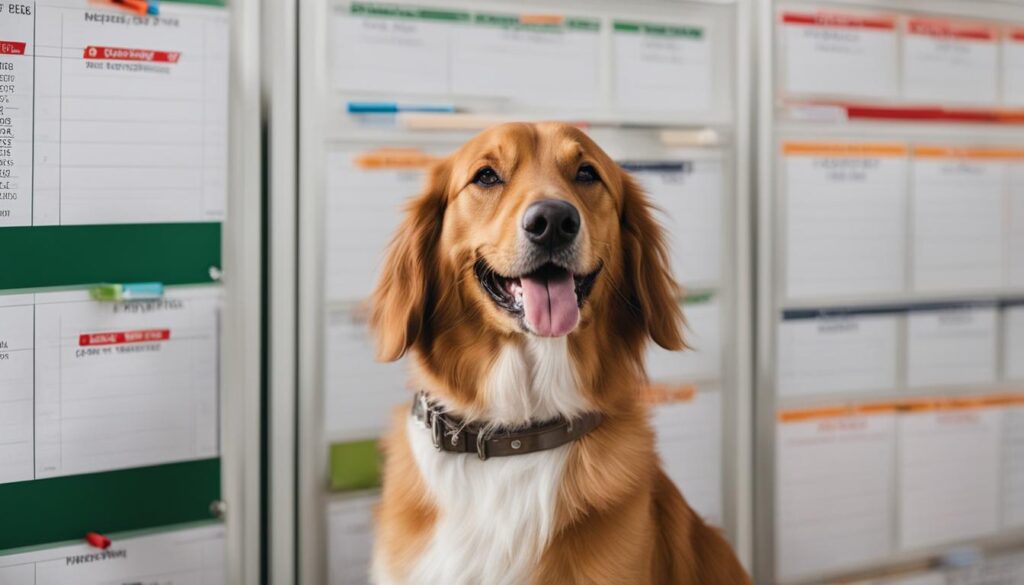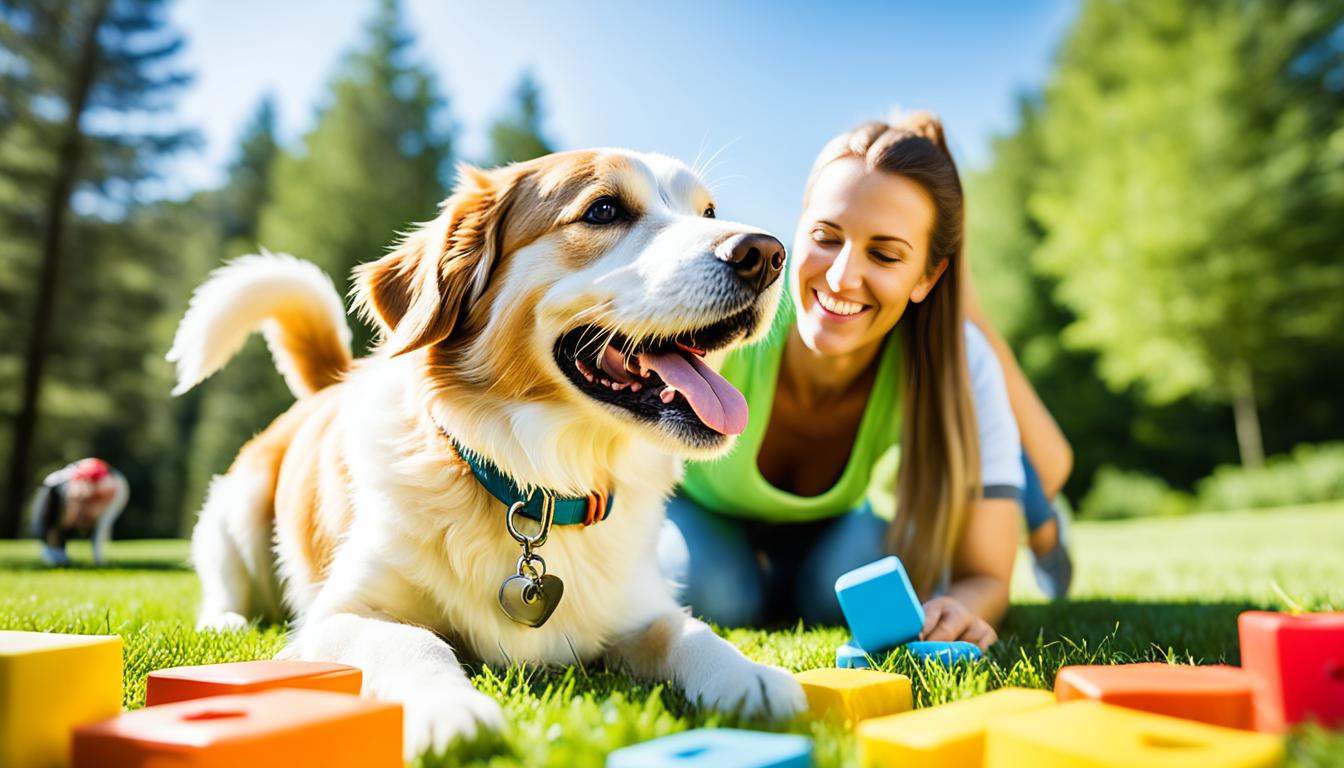Caring for your pet’s mental and emotional well-being is a vital component of their overall health and happiness. Just like humans, pets have feelings and emotions that can greatly impact their well-being. Understanding their needs and providing the necessary care is essential for keeping them healthy and maintaining their wellness. In this section, we will explore some valuable tips and advice to help you ensure your pet’s mental and emotional well-being.
From providing a nurturing environment to engaging them in mental stimulation activities, there are several measures you can take to support your pet’s mental and emotional health. By implementing these tips, you can contribute to their overall happiness and quality of life.
So, let’s dive in and discover the best ways to care for your pet’s mental and emotional well-being!
Key Takeaways:
- Understanding and addressing the mental and emotional needs of your pet is crucial for their overall well-being.
- A nurturing environment, mental stimulation, and regular exercise are essential factors in promoting your pet’s mental and emotional health.
- Recognizing signs of stress and anxiety in your pet and taking appropriate steps can alleviate their emotional burdens.
- Prioritizing your pet’s mental and emotional well-being not only benefits them but also enhances the bond between you.
- By implementing the provided tips and advice, you can ensure a happier and healthier life for your furry friend.
The Fundamentals of Holistic Pet Care
Holistic pet care encompasses a comprehensive approach to your pet’s well-being, considering their physical, mental, and emotional needs. By adopting a holistic approach, you prioritize the overall health and happiness of your beloved companion. In this section, we will delve into the importance of animal welfare, explore the five domains model of pet well-being, and understand your pet’s behavioral needs.
Defining Animal Welfare and Its Importance
Animal welfare refers to the physical and psychological well-being of animals, ensuring they are treated with kindness, respect, and compassion. It is our moral responsibility as pet owners to provide the highest level of care for our furry friends. A holistic approach to pet care recognizes the connection between animal welfare, overall health, and quality of life.
The Five Domains Model for Pet Well-being
The five domains model is a framework used to assess and improve the well-being of animals. It considers five essential domains: nutrition, environment, health, behavior, and mental states. Adhering to this model helps create a balanced and harmonious life for your pet. By addressing each domain with care and dedication, you can ensure that your pet’s needs are met in a holistic manner.
Understanding Your Pet’s Behavioral Needs
Understanding your pet’s behavioral needs is crucial for their well-being. Different pets have unique personalities, instincts, and preferences. By observing and recognizing their behavioral cues, you can tailor their care and environment to support positive behaviors and address any challenges they may face. This understanding fosters a stronger bond with your pet and promotes their overall mental and emotional well-being.
https://www.youtube.com/watch?v=WJ0kE3msQ5Y
Creating a holistic environment that nurtures your pet’s physical, mental, and emotional health is paramount. With a deeper understanding of animal welfare, the five domains model, and your pet’s behavioral needs, you can provide the optimal care they deserve.
How Pets Enrich Our Lives and What We Can Give in Return
Pets are more than just adorable companions – they significantly enrich our lives. The bond between humans and animals goes beyond cuddles and playtime. In fact, the connection we share with our pets has both physical and mental benefits for us. Additionally, our furry friends can positively influence our overall health and wellness. Let’s explore the amazing ways in which pets enhance our lives and what we can do to give back to them.
The Human-Animal Bond: Physical and Mental Benefits
The relationship between humans and animals is known as the human-animal bond. This bond brings along a multitude of physical and mental advantages for both human owners and their pets. Studies have shown that spending time with animals can reduce stress levels and lower blood pressure, promoting better cardiovascular health. Moreover, the companionship of pets has been found to alleviate feelings of loneliness and depression, boosting overall mental well-being. These remarkable physical and mental benefits highlight the importance of nurturing our bond with pets.
Companion Animals’ Influence on Human Health
Companion animals, such as dogs and cats, have a profound impact on our health and well-being. Owning a pet encourages regular exercise, as daily walks with dogs and play sessions with cats keep us active and help maintain a healthy weight. Furthermore, the responsibility and routine associated with pet ownership can foster a sense of meaning and purpose, promoting mental and emotional stability. The unconditional love and support provided by our furry friends can even enhance our immune system and boost our resilience against common illnesses. It’s incredible how our pets contribute to improving our overall health.
Choosing the Right Pet for Your Lifestyle
When considering pet ownership, it’s crucial to choose an animal that aligns with your lifestyle. Different pets have varying exercise, nutrition, and healthcare requirements. For example, energetic dog breeds may need more frequent exercise, while certain cat breeds thrive in low-energy environments. By selecting a pet that suits your lifestyle and preferences, you can ensure a harmonious and fulfilling relationship. Consulting with a reputable animal shelter or breed-specific rescue organization can provide valuable guidance in finding the perfect pet for you.

[Above: An image of a person and their pet, representing the human-animal bond.]
Creating a Nurturing Environment for Your Companion Animal
A nurturing environment is crucial for the mental and emotional well-being of your companion animal. By providing a safe and comfortable space, engaging in enriching activities, and encouraging social interaction, you can ensure your pet’s overall wellness. Let’s explore some tips on how to create the ideal environment for your furry friend.
Firstly, it’s important to provide a safe and comfortable space for your pet. This includes a designated area for sleeping and resting, as well as creating a secure environment where they feel protected. Make sure to pet-proof your home, removing any potential hazards or toxic substances that could harm your pet.
Enriching activities play a significant role in promoting your pet’s mental stimulation and overall well-being. Consider introducing interactive toys, food puzzles, and scratching posts to keep your pet engaged and entertained. These activities not only provide mental stimulation but also help prevent boredom and destructive behaviors.
Social interaction is another essential aspect of a nurturing environment for your pet’s well-being. Allocate dedicated time each day for playtime, exercise, and bonding activities with your pet. This can include interactive play sessions, walks in the park, or even joining a local pet socialization group. Positive social interactions contribute to your pet’s mental health and overall happiness.
In summary, creating a nurturing environment for your companion animal involves providing a safe and comfortable space, engaging in enriching activities, and encouraging social interaction. By considering these key elements, you can ensure that your pet’s mental and emotional well-being is prioritized, leading to a healthier and happier life for your furry friend.
Nutrition as the Foundation of Pet Health and Wellness
Proper nutrition plays a crucial role in the health and well-being of your pet. Providing your furry friend with a balanced diet and essential nutrients is essential for their overall health and vitality.
When it comes to pet nutrition, there are a few tips to keep in mind:
- Choose high-quality pet food that is specifically formulated for your pet’s age, size, and breed.
- Read the ingredients list carefully and avoid foods that contain fillers, artificial additives, and excessive amounts of preservatives.
- Ensure that your pet’s diet includes a variety of proteins, carbohydrates, healthy fats, vitamins, and minerals.
- Consult with your veterinarian to determine the appropriate portion sizes for your pet and to address any specific dietary needs or restrictions.
Remember, maintaining a healthy and balanced diet is essential for your pet’s overall well-being. By providing them with the proper nutrition, you are setting them up for a happy and healthy life.

| Nutrient | Function | Sources |
|---|---|---|
| Protein | Builds and repairs tissues, supports a healthy immune system | Meat, fish, poultry, eggs, dairy products |
| Carbohydrates | Provide energy and fiber | Grains, fruits, vegetables |
| Fats | Source of energy, helps with nutrient absorption, maintains healthy skin and coat | Oils, meat, fish |
| Vitamins | Support various bodily functions | Fruits, vegetables, supplements |
| Minerals | Essential for healthy bones, teeth, and overall body function | Meat, fish, poultry, vegetables |
Maintaining Pet Wellness Through Preventive Healthcare
Preventive healthcare is crucial for maintaining your pet’s overall wellness. By taking proactive measures, you can support your pet’s long-term health and ensure a happy and healthy life for them. In this section, we will explore various preventive measures, including regular exercise, dental care, and mental stimulation, that play a vital role in keeping your pet in optimal condition.
Preventive Measures to Support Your Pet’s Long-Term Health
Taking preventive measures is an essential part of responsible pet ownership. By incorporating these pet health tips into your routine, you can promote your furry friend’s well-being:
- Provide a balanced diet: Proper nutrition is the foundation of a healthy pet. Consult with your veterinarian to ensure your pet receives a balanced and nutritious diet.
- Regular exercise: Engage your pet in regular physical activity to keep their weight in check, improve cardiovascular health, and promote mental stimulation.
- Mental stimulation: Keep your pet’s mind active by providing puzzle toys and engaging in interactive playtime sessions.
- Dental care: Brush your pet’s teeth regularly and provide dental treats or toys to maintain good oral hygiene and prevent dental diseases.
- Regular grooming: Regular grooming sessions help monitor your pet’s skin and coat health, preventing issues such as matting and skin infections.
Veterinary Check-ups: The Pillar of Preventive Pet Healthcare
Veterinary check-ups are a fundamental aspect of preventive pet healthcare. Routine visits to your veterinarian allow for early detection of potential health issues and ensure timely intervention. During these check-ups, your veterinarian will assess your pet’s overall health, perform necessary vaccinations, conduct preventive screenings, and provide appropriate advice for your pet’s specific needs.
By establishing a strong partnership with your veterinarian, you can work together to develop a comprehensive preventive healthcare plan tailored to your pet’s individual requirements.
The Role of Vaccinations and Parasite Prevention
Vaccinations and parasite prevention are crucial components of preventive healthcare. Vaccinations protect your pet against potentially life-threatening diseases and help maintain their well-being. Your veterinarian will recommend a vaccination schedule based on your pet’s age, lifestyle, and risk factors.
Parasite prevention is equally important to safeguard your pet’s health. Fleas, ticks, and intestinal parasites can cause a range of health issues, including discomfort, disease transmission, and sometimes even death. Regular preventive treatments, such as flea and tick control products and deworming medications, are essential for keeping your pet safe from these parasites.
By diligently following your veterinarian’s recommendations for vaccinations and parasite prevention, you can significantly minimize the risk of infectious diseases and protect your pet’s well-being.
| Preventive Measures | Benefits |
|---|---|
| Regular exercise | Promotes physical fitness and mental stimulation |
| Dental care | Prevents dental diseases and maintains oral health |
| Mental stimulation | Keeps the mind active and prevents boredom |
| Veterinary check-ups | Allows for early detection of health issues |
| Vaccinations | Protects against life-threatening diseases |
| Parasite prevention | Prevents infestations and disease transmission |
Strategies and Exercises for Pet Mental Stimulation
Mental stimulation is essential for your pet’s cognitive health and well-being. Just like humans, pets thrive when their minds are challenged and engaged. In this section, we will explore various strategies and exercises to provide your pet with the mental stimulation they need to stay happy and healthy.
Puzzle Toys and Feeding Games to Engage Your Pet’s Mind
One of the most effective ways to stimulate your pet’s mind is through puzzle toys and feeding games. These interactive toys require your pet to problem-solve and use their cognitive skills to access treats or food. Puzzle toys come in various forms, including treat-dispensing balls, interactive puzzles, and puzzle feeders. These toys provide mental stimulation while satisfying your pet’s natural instincts.

Physical Activities to Promote a Healthy Body and Mind
Physical exercise is not just beneficial for your pet’s physical health; it also plays a significant role in their mental well-being. Engaging in regular physical activities helps reduce stress, anxiety, and boredom in pets. Take your dog for daily walks and allow them to explore their surroundings. Provide ample playtime with interactive toys and engage in activities like fetch or hide-and-seek. For cats, incorporate play sessions with toys that mimic prey-like movements or use a laser pointer to stimulate their natural hunting instincts.
Socialization: A Key Aspect of Emotional Well-being
Socialization is fundamental to your pet’s emotional health and well-being. It helps them develop positive behavior, build confidence, and form healthy relationships with other animals and humans. To provide socialization opportunities for your pet, consider enrolling them in obedience classes, doggy playgroups, or playdates with other friendly pets. Regular interaction and exposure to different environments and situations will help your pet feel more confident and adaptable.
We hope these strategies and exercises for pet mental stimulation will help you provide the enriching experiences your furry friend deserves. By engaging your pet’s mind and promoting their emotional well-being, you can ensure they lead a happy and fulfilling life.
The Importance of Routine and Its Effect on Pets
Establishing a routine is essential for maintaining your pet’s health and wellness. A consistent schedule for feeding, exercise, and mental stimulation can have a positive impact on their overall well-being, contributing to a balanced and fulfilling life.
When it comes to feeding, it is important to establish regular meal times to ensure that your pet receives the nutrition they need. Consistency in feeding times helps regulate their digestive system and prevents overeating or underfeeding. Additionally, providing a balanced diet with high-quality pet food is crucial for their optimal health.
Regular exercise is another key aspect of maintaining your pet’s wellness. Dogs, for example, require daily physical activity to keep their bodies and minds stimulated. Set aside dedicated time for walks, playtime, and interactive activities that cater to your pet’s needs. Not only does exercise help prevent obesity, but it also improves muscle tone, enhances cardiovascular health, and promotes mental well-being.

In addition to physical exercise, mental stimulation is equally important for pets’ overall well-being. Engage your pet in puzzle toys and feeding games that challenge their problem-solving skills and keep their minds sharp. This mental stimulation helps prevent boredom and anxiety while promoting mental and emotional wellness.
By establishing a routine that includes regular feeding, exercise, and mental stimulation, you can ensure that your pet’s physical and mental needs are met effectively. Consistency in these areas not only helps maintain their health but also strengthens the bond between you and your furry friend.
Recognizing and Alleviating Stress in Pets
We understand that pets, just like humans, can experience stress and anxiety. It is crucial for pet owners to recognize the signs of stress in their furry friends and take steps to alleviate it. In this section, we will discuss common signs of stress and anxiety in animals, provide tips on how to establish a calming environment for your pet, and offer guidance on when to seek professional help for your pet’s mental health.
Common Signs of Stress and Anxiety in Animals
Pets may demonstrate various signs and behaviors when they are feeling stressed or anxious. It is important to pay attention to these signs and address them promptly. Some common signs include:
- Excessive panting or drooling
- Increased aggression or irritability
- Excessive grooming or self-mutilation
- Loss of appetite or changes in eating habits
- Withdrawal or hiding
- Excessive barking or meowing
- Increased urination or accidents
- Restlessness or pacing
By recognizing these signs, you can intervene early and provide the necessary support to help your pet overcome stress and anxiety.
How to Establish a Calming Environment
Creating a calming environment for your pet can greatly reduce their stress and anxiety levels. Here are some tips to establish a calming environment:
- Create a safe and comfortable space for your pet, such as a designated area with their bed, toys, and water bowl.
- Provide a quiet and peaceful environment, free from loud noises or excessive stimulation.
- Introduce calming scents, such as lavender or chamomile, which can have a soothing effect on pets.
- Use pheromone diffusers or sprays, specifically designed to reduce stress in pets.
- Implement a consistent daily routine to provide structure for your pet.
By implementing these strategies, you can create a calming environment that promotes your pet’s well-being and helps them feel safe and secure.
When to Seek Professional Help for Your Pet’s Mental Health
In some cases, a pet’s stress and anxiety may require professional intervention. If you notice persistent or severe signs of stress in your pet, it is important to consult a veterinarian or an animal behaviorist. They can provide expert guidance and develop a personalized treatment plan to address your pet’s specific needs.
Remember, your pet’s mental health is just as important as their physical well-being. By recognizing and alleviating stress in your pet, you can ensure a happier and healthier life for your beloved companion.
Pet Health and Wellness Tips for a Happier, Healthier Pet
Providing optimal care for your pet involves a holistic approach that encompasses their physical, mental, and emotional well-being. In this section, we offer valuable pet health and wellness tips to help you create a happier and healthier life for your furry companion.
Nutrition:
- Ensure a balanced diet by offering high-quality pet food that meets their specific nutritional requirements.
- Consult your veterinarian for personalized dietary recommendations based on your pet’s age, breed, and health condition.
- Provide fresh water at all times to keep your pet adequately hydrated.
Exercise:
- Engage in regular physical activities with your pet to promote their overall fitness and mental stimulation.
- Consider their breed and age when determining the appropriate exercise intensity and duration.
- Explore different activities such as walking, playing fetch, or agility training to keep them active and engaged.
Mental Stimulation:
- Offer mentally stimulating toys, puzzles, and interactive games to keep your pet’s mind sharp and engaged.
- Rotate toys regularly to prevent boredom and maintain their interest.
- Provide opportunities for exploration and new experiences to prevent monotony.
Preventive Healthcare:
- Schedule regular veterinary check-ups to monitor your pet’s overall health and detect any potential issues early on.
- Stay up-to-date with vaccinations and parasite prevention measures.
- Maintain a dental care routine to prevent dental diseases.
Maintaining Pet Wellness:
- Keep your pet’s living environment clean and free from hazards.
- Ensure they have a comfortable and cozy resting area.
- Provide opportunities for social interaction with other pets and humans.
By following these pet health and wellness tips, you can enhance the quality of life for your beloved companion and establish a strong foundation for their long-term well-being.
Conclusion
Celebrating the Rewards of Caring for Our Pet’s Mental and Emotional Well-being
As pet owners, we have the incredible opportunity to care for our furry companions’ mental and emotional well-being. By prioritizing their emotional health, we not only enhance their lives but also experience the immeasurable rewards of a deep and loving bond with our pets. When we acknowledge and address their emotional needs, we create a harmonious environment where they can truly thrive.
The Ripple Effect of Positive Pet Care on Society
Furthermore, our efforts to care for our pets’ mental and emotional well-being extend beyond their individual circumstances. The positive impact of pet care ripples throughout society, fostering compassion, empathy, and responsibility. By nurturing our pets’ emotional health, we contribute to a more caring and understanding society where love and empathy are valued.
Ensuring a Lasting, Loving Bond with Your Pet
Maintaining a lasting, loving bond with our pets requires ongoing commitment and understanding. By continuing to prioritize their mental and emotional well-being, we strengthen the foundation of our relationship. It is through our care and dedication that we forge a bond that transcends words, forming a connection that sustains us and brings immeasurable joy to our lives.
Maintaining Pet Wellness – Our Ongoing Responsibility
As we conclude this comprehensive guide on caring for our pet’s mental and emotional well-being, let us remember that our responsibility to maintain their wellness is ongoing. By applying the pet health and wellness tips, pet care advice, and pet health guidelines discussed throughout this article, we can ensure that our furry friends live happier, healthier lives. Let us continue to prioritize their mental and emotional well-being, for they deserve nothing less.
FAQ
What are some ways to ensure my pet’s mental and emotional well-being?
Caring for your pet’s mental and emotional well-being involves providing a nurturing environment, engaging in mental stimulation activities, and recognizing and alleviating stress or anxiety.
What is holistic pet care?
Holistic pet care considers your pet’s physical, mental, and emotional needs. It involves a comprehensive approach to their well-being, including natural remedies and preventive healthcare.
How does the human-animal bond benefit both humans and pets?
The human-animal bond offers physical and mental benefits to humans, such as reduced stress and improved overall well-being. For pets, it provides companionship, love, and a fulfilling relationship.
How can I create a nurturing environment for my pet?
To create a nurturing environment, provide a safe and comfortable space, engage in enriching activities, and ensure social interaction with both humans and other animals.
How important is nutrition for my pet’s health and wellness?
Proper nutrition is essential for your pet’s well-being. It provides the foundation for good health, supports their immune system, and helps maintain a healthy weight.
What preventive measures should I take to ensure my pet’s overall wellness?
To maintain your pet’s overall wellness, engage in regular exercise, provide dental care, mental stimulation, and ensure they receive regular check-ups, vaccinations, and parasite prevention.
How can I stimulate my pet’s mind?
There are various strategies to provide mental stimulation for your pet, such as puzzle toys, feeding games, physical activities, and socialization with other pets and humans.
Why is establishing a routine important for my pet?
Establishing a routine helps your pet feel secure and provides structure in their daily life. It promotes a sense of stability and contributes to their overall health and happiness.
How can I recognize and alleviate stress in my pet?
Common signs of stress in pets include changes in behavior, appetite, and grooming habits. To alleviate stress, create a calming environment, establish routines, and seek professional help if needed.
What are some pet health and wellness tips I should know?
Some pet health and wellness tips include providing a balanced diet, regular exercise, mental stimulation, preventive healthcare, and a nurturing environment.
Source Links
- https://www.mentalhealth.org.uk/explore-mental-health/a-z-topics/pets-and-mental-health
- https://www.helpguide.org/articles/mental-health/mood-boosting-power-of-dogs.htm
- https://www.rspcapetinsurance.org.au/pet-care/health-and-wellbeing/emotional-wellbeing-of-pets

